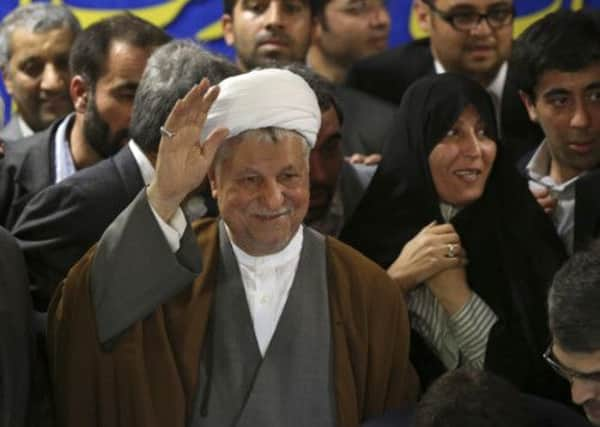Iran: Rafsanjani to stand in presidential election


The move puts the 78-year-old on a collision course with Iran’s supreme leader, Ayatollah Ali Khamenei, who backed incumbent Mahmoud Ahmadinejad’s disputed re-election four years ago.
Mr Rafsanjani and the ayatollah worked together for half a century, first as revolutionaries to topple the Shah, and then as wartime leaders in the conflict with Saddam Hussein’s Iraq.
Advertisement
Hide AdAdvertisement
Hide AdHowever their working relationship broke down over Mr Ahmadinejad’s second term.
The ayatollah backed Mr Ahmadinejad while Mr Rafsanjani sided with the opposition reformist Green Movement whose mass street protests against the “stolen” election were brutally crushed by regime forces.
Mr Khamenei, who has since fallen out with Mr Ahmadinejad because of the latter’s perceived disloyalty, had hoped the unruly outgoing president he once championed would be replaced by a pliant and uncharismatic fundamentalist acolyte.
Those calculations have been thrown into disarray both by Mr Rafsanjani’s game-changing candidacy and that of Mr Ahmadinejad’s controversial protégé, Esfandiar Rahim Mashaei. The latter is despised by Iran’s old guard which accuses him of leading a “deviant” faction in Mr Ahmadinejad’s administration that promotes Iranian nationalism over clerical rule.
Nearly 700 hopefuls, including 30 women, have registered to contest the 14 June presidential election. Their candidacies are being vetted by the Guardian Council, a conservative panel controlled by the supreme leader which will examine their loyalty to the regime and Islam. Only a handful will make it on to the final ballot.
Yesterday, nearly 100 conservative Iranian MPs petitioned the Guardian Council to bar both Mr Rafsanjani and Mr Mashaei from running
One of the MPs from the 290-seat parliament, Javad Karimi Qodoosi, said they want Mr Rafsanjani barred for supporting the opposition in 2009 and Mr Mashaei disqualified for his “un-Islamic ”attitudes.
Nicknamed “Kooseh”, the Farsi word for “shark”, because of his smooth features and wiliness, Mr Rafsanjani has been endorsed by another former president, Mohammad Khatami, the popular standard bearer of Iran’s battered reformist movement.
Advertisement
Hide AdAdvertisement
Hide AdMr Khatami is likely to feature prominently in any Rafsanjani administration, which would be expected to try to reduce tensions with the West over Iran’s nuclear programme, and to foster better relations with Gulf Arab states.
Iranian hardliners have already branded Mr Rafsanjani a no-hoper past his sell-by date. “Hashemi [Rafsanjani] knows he is unpopular, a loser and too old,” Mehdi Taeb, a hardline cleric affiliated with Iran’s Revolutionary Guards, said on Sunday.
Mr Rafsanjani brushed aside all such concerns, declaring recently that, despite approaching 80: “I am strong enough to control Iran.”
His entry into the race will force Mr Khamenei to re-calculate. The ayatollah’s interests in the election are represented by several hardline acolytes known as “principlists” because of their loyalty to him and the principles of the Islamic republic.
Three of these have formed a coalition with the stated intention that only one will finally stand to ensure the conservative vote is not split. Their alliance includes the charismatic mayor of Tehran, Mohammad Baqer Qalibaf, a former foreign minister, Ali Akbar Velayati, and Gholam-Ali Haddad-Adel, a former speaker of parliament whose daughter is married to Mr Khamenei’s son, Mojtaba. But their coalition has yet to say who will be its “unity” candidate.
One consolation for Mr Khamenei is that the candidacies of Mr Rafsanjani and Mr Mashaei will likely boost turnout among voters who otherwise would be faced with choosing from a narrow slate of the supreme leader’s yes-men. The regime invariably claims a high turnout as proof of its popular legitimacy.
Iranian elections are tightly-controlled, but their outcomes are rarely predictable and they do throw up surprises. Mr Khatami’s landslide election in 1997 was unexpected, as was Mr Ahmadinejad’s victory in 2005. So the possibility of a Rafsanjani return is far from outlandish.